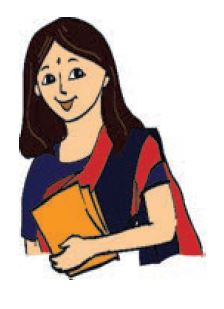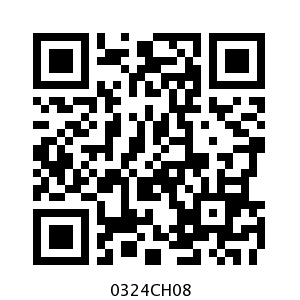Table of Contents
UNIT VIII
Have you ever received a letter? If you haven’t, see what this child decides to do!
What’s in the Mailbox?

Most always, when the postman comes
With letters, two or three,
They’re for my Mother or my Dad
But never one for me.
I'm going to write some letters, though,
That’s what I'm going to do,
And then my friends will answer me
And I’ll get letters too!
New words
letters, always, never, though
Reading is fun
1. Who does the postman bring letters for?
2. Does the child ever get a letter?
3. What does the child decide to do?
Talk time
1. Have you written letters?
2. Who have you written to?
3. Who would you like to write to today? Why?
Read this letter carefully
Devu has written a letter to his grandfather thanking him for a birthday gift.
H. No. 1792, Darya Ganj
New Delhi 110 007
25 January 2006
Dear Grandfather
Thank you for the beautiful book of Panchatantra stories. You will be happy to know that I read one story every day.
With love
Devu
Let’s write
Now write a letter to your friend, telling her about your school. You can use some of these words:
classrooms, children, bell, blackboard, teacher, building
Paper fun
Activity: Let’s make an envelope and post our letter too!
1. Take a square piece of paper.
2. Fold all the four corners to make folds.
3. Fold two corners and paste them with a little glue.
4. Fold the third corner and paste it with glue.
5. Leave the fourth corner open.
Write the address neatly on the envelope and fix the stamp on the right corner.
Put the letter inside it. Now seal the fourth corner as well. Your letter is ready to be posted to your friend.
Word building
Here are some people who help us.
Let’s try matching A with B.
| A | B |
| 1. A postman | drives a motor vehicle |
| 2. A cobbler | teaches in a school |
| 3. A librarian | looks after patients |
| 4. A driver | writes plays |
| 5. A dramatist | travels in a space craft |
| 6. A teacher | makes people laugh |
| 7. A nurse | mends our shoes |
| 8. A musician | Plays musical instruments |
| 9. An astronaut | works in a library |
| 10. A clown | brings our letters |
MY SILLY SISTER

Mother, your baby is silly! She is so very childish!
She does not know the difference between the lights in the streets and the bright stars.
When we play with pebbles, she thinks they are real food. She even tries to put them into her mouth.
When I open a book before her and ask her to learn her a b c, she tears the pages with her hands and roars with joy at nothing. This is your baby’s way of doing her lessons!


When I shake my head at her in anger and scold her, or call her naughty, she laughs and thinks it great fun.
Everybody knows that Father is away, but sometimes I call out "Father" playfully. She looks quickly about her in excitement and thinks that Father is near.
Sometimes I hold a class with the donkeys that our washerman brings to carry away the dirty clothes. I warn her that I am the schoolmaster and that she better not make any noise. Only then she keeps quiet. I insist that she should call me “dada”.
Your baby wants to catch the moon. She is really funny. Mother, your baby is silly. She is so very childish!
Rabindranath Tagore
New words
childish, pebble, donkey, dirty, anger, excitement, playful, naughty, washerman
Reading is fun
1. What does the baby do with the pebbles?
2. What does the baby do with the book?
3. When does the baby laugh?
4. Why does the washerman bring donkeys?
Talk time
1. What is the funniest thing the baby does?
2. Do you think the baby sister is really silly? Why?
Let’s move and dance
Hands are for clapping,
Feet are for walking,
Hips are for shaking,
Arms are for stretching,
Eyes are for blinking,
Heads are for nodding,
Elbows are for moving,
Mouths are for talking.
(You can make similar verses of your own.)
Word building
1. Fill in the blanks to spell words from the story.
S i _____ _____ y
p e _____ _____ l _____ s
s t r _____ e t s
s _____ o l d
l e _____ _____ o n s
n _____ u _____ h t y
e x c _____ t _____ m _____ n t
d _____ n k _____ y
2. Write similar words from the story:
Foolish _____
Stones _____
Mischievous _____
Fetch _____
3. Fill in the blanks with words from the box
children, they, bell
The _____ are playing in the field. _____ are happy.
_____ are playing ‘catch-me-if-you-can.’
The _____ has rung. It is time for lessons.
4. Fill in the blanks
i. One child, many _____ .
ii. One fox, many _____ .
iii. One duck, many _____.
iv. One goose, many _____ .
5. Add ‘ful’ to make a word.
a. The children are _____. (play)
b. The flowers are _____ . (beauty)
c. The books are _____ . (use)
d. The vegetables are _____. (plenty)
6. Add ‘ly’ to make a word
a. The new shoes are _____ . (love)
b. He is _____ smart. (real)
c. We should eat _____ . (slow)
d. Let us sing _____ . (soft)
7. Add ‘ish’ to make a new word.
a. That girl is always crying. She is _____ . (child)
b. I slipped on a banana peel. I feel_____ . (fool)
c. My sister is _____. (baby)
Let’s write
Write five sentences on how you help at home.
I help mother _____
I help father _____
I also help my brother in _____
I also help my sister with _____
I do_____ in the house.
Say aloud
| Donkey | Sister |
| Monkey | Mother |
| Turkey | Father |
I’m a popcorn
Put me in a pan
Shake me and shake me
As fast as you can
And I’ll pop!
Teacher's Page: UNIT VIII
Themes
- Communication and Letter Writing
- Games and Play
SUGGESTIONS FOR CLASSROOM TEACHING
- Read the poem with proper stress and intonation. Help the children to recite the poem with you with appropriate actions.
- Let them also read and enjoy the poem silently.
- Encourage children to guess the meanings of difficult words, before you explain.
- Ask the children to bring one inland letter each. Show them on the blackboard where to write the date, address etc. using the new format, where the address, date, and the name of the letter writer are aligned on the left hand margin. Ask them to write a letter with a proper beginning and ending. This can also be done in pairs.
- If it is possible, arrange a visit to the local post office.
- Children can also make greeting cards with colourful drawings. Encourage them to fold paper in different ways to make cards, e.g. a card with a border, a card opening in the middle, a card folded into four and so on.

- Discuss the different forms of communication like telephone, telegram, email etc. with advantages and disadvantages of each.
- You should enjoy telling the story. The teacher does not tell it merely to inform, enlighten or amuse but because it is something so good, so delightful. You must remember that to be friends with your story you must grasp it, feel it, and share it with the children.
- Let children talk about their brothers, sisters, cousins etc. Bring out the concept of caring and sharing, and emotional bonding within families.






